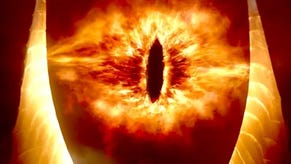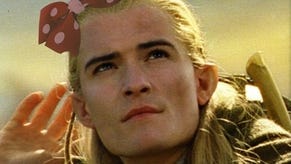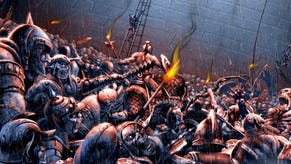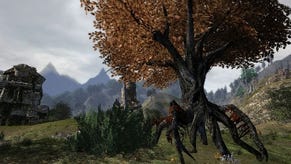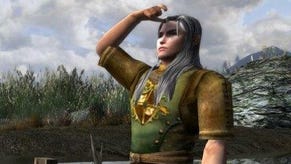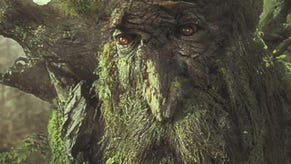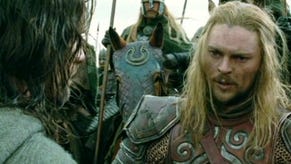The Lord of the Rings Online
Elves and Men and Nasssty Orcses...
In a long-forgotten cavern deep within the bowels of Middle-Earth, filled with lost treasures and the vengeful, embittered wraiths of an ancient race of warrior men, I am desperately flicking my mouse pointer over my toolbar in the hope of working out where the hell my healing spells are.
This isn't, I reflect sadly, quite the role I had seen myself playing in Tolkien's epic fantasy. As a young boy with a hyperactive imagination, I'd always sort of assumed I'd ride alongside Aragorn, fend off the Nazgul at the shattered hilltop fortress of Amon Sul, contribute something wise (but probably high pitched) to the council of Elrond, or rescue the Fellowship from doom in the dank darkness of the mines of Moria.
Being a furry-footed Hobbit bard who's being bellowed at by a company of taller and burlier adventurers to get his chubby little fingers out of his arse and start dishing out the heals pronto wasn't on the menu, as far as I can recall. But even as my real-life chubbies dash over the keyboard and I rescue one companion from doom even as another flatlines, and the wights close in around us, one thing is inescapable.
I'm grinning; smiling like an idiot, because the forgotten fantasies of the 11 year old who was enraptured by Lord of the Rings a decade and a half ago are coming to life again. This is, unmistakably, Middle Earth; I am accompanied by Elves and Dwarves, Men and Hobbits, and we're underneath the Misty Mountains battling evil wights. Every now and then, that fact hits me in the face again, and even to the cynical 26 year old, it's a genuine thrill.
The Eye of the Enemy
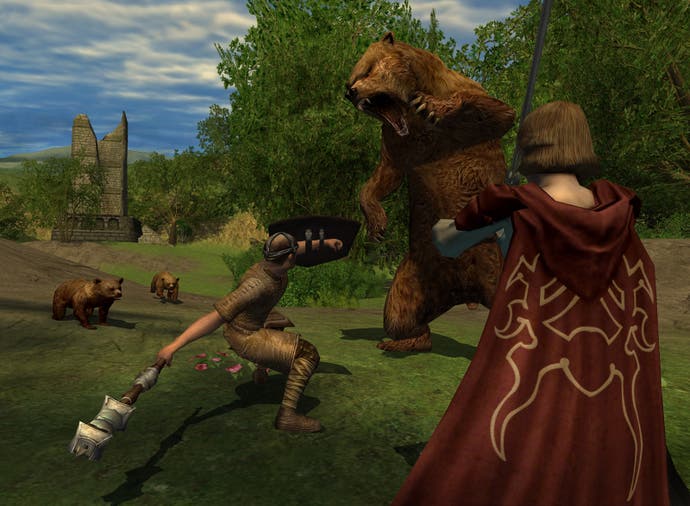
It would be incredibly easy at this point to insert a "But..." and launch into full-on Comic Book Guy mode. There's plenty to criticise, after all, because there's simply no way that developers Turbine (of Asheron's Call fame) could have built a Lord of the Rings MMORPG without making radical changes to some of Tolkien's material.
Yes, you're going to see lots of feisty little hobbits running around waving swords in Orcs' faces; yes, there are going to be dwarves and elves wandering in and out of towns and villages where they simply have no place being in Tolkien's lore. Moreover, in order to provide a solid basis for the adventures of player characters in LOTRO, Turbine has invented a vast new cast of characters, new locations, and even an entirely new storyline element which was nowhere to be found in The Fellowship Of The Ring.
The problem, you see, is that you can't really have thousands of people following Frodo and the Fellowship around - that simply won't work. So yes, your adventures in The Shire, at Bree and Weathertop, and at Rivendell will intersect with the Fellowship on occasion, and sometimes you'll be sent on quests that help out the Fellowship by clearing the path for them, or whatever. However, the main thrust of LOTRO is really a side-story to the Fellowship's quest. The subtitle of the game is Shadows of Angmar, and it introduces the idea that while Frodo and his tubby gardening pal were plodding along to Rivendell, a huge threat was gathering to the north, in the ancient evil kingdom of Angmar.
Turbine's invention - which will probably have Lord of the Rings purists gasping in horror, I suppose - is the idea that Sauron has sent the Witch-King, the leader of his creepy Ringwraiths, back to their ancient kingdom to raise some hell. The idea is that they will crush the realms of Men from the north-east, while the forces of Mordor swoop up from the south-west. Angmar now threatens all of Eriador - that's the bit of Middle-Earth west of the Misty Mountains, and it's where the entirety of LOTRO is set, for now. No Mordor, no Gondor or Rohan or Mirkwood in this iteration of the game; they'll be added down the line, as LOTRO expands over the years to cover the entire continent, and the entire continuity of the trilogy.
Is it authentic Tolkien? No, it's not. LOTRO takes liberties with the source material that even Peter Jackson's movie adaptations wouldn't have dared to touch - but so far, it looks like Turbine has done a rather good job with these departures from canon. The Angmar story isn't in Fellowship of the Ring, but it doesn't feel out of place either; you feel like it could have happened in Tolkien's continuity, and for a casual fan of LOTR (which, let's face it, is most of us) that's all that really matters. In essence, what Turbine has done is to flesh out the stuff that happens "off-camera" in LOTR. While there will inevitably be expressions of horror all over the world's LOTR web-forums at some of their decisions, it looks like the game is actually going to do surprisingly well at fitting into people's expectations of Middle Earth.
Something stirs in the East
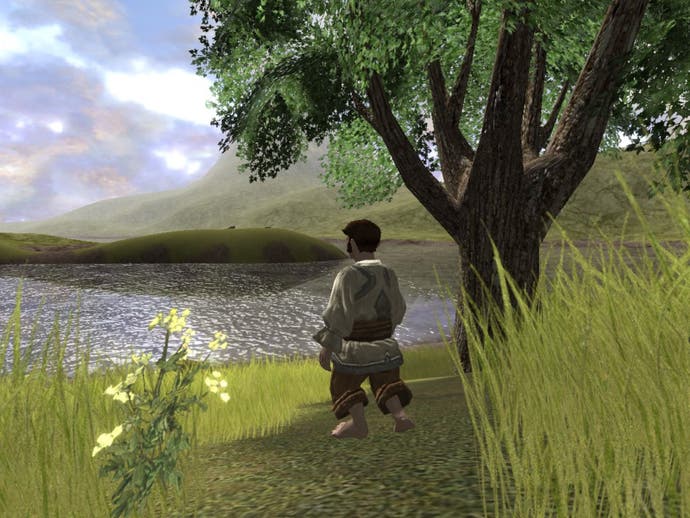
In terms of how you actually play Lord of the Rings Online, much of the basic interface will be incredibly familiar to anyone who has ever dipped into World of Warcraft. You've got your inventory and equipment screens, familiar default key bindings for maps and chat, a toolbar of actions, various spell and talent screens; on a basic level, if you've ever played an MMO before, you'll be up and running in LOTRO in no time.
The seven character classes on offer are all fairly familiar as well, although they use names which are more appropriate to LOTR than to more generic fantasy universes. Interestingly, Turbine defines the character classes not just by the fantasy archetypes they fit, but also by which Lord of the Rings character they are closest to. As such, the Lore Master isn't just the Mage of the game, it's also modelled closely on the abilities of Gandalf; the Guardian is the tank, and follows Gimli's attributes.
You can probably work out the rest; Legolas is the Hunter, Aragorn is the Champion, essentially the damage-dealing warrior of the group. On the slightly more obscure side of things, the Captain is the Paladin class of the game, and follows the archetype of Boromir; while the Burglar is somewhat similar to the Rogues of other games, and is modelled after Frodo. The odd one out is the Minstrel, who (as I learned in our first encounter in the game) is the Priest of the group, boosting Morale (HP to you and I) with his various spells and songs. According to LOTRO producer Jeff Steefel, he's modeled to some extent after Elrond.
However, the instant familiarity of the game is matched by a gradual introduction of brand new elements, which do quite a good job of setting the game aside from World of Warcraft and its ilk. Perhaps the most interesting of those elements is the concept of Deeds and Titles, which offer a whole new degree of character customisation, completely outside the standard XP and levelling system (which, in this initial release, caps out at level 50).
The idea is that as you progress through the game, you'll be able to undertake various feats, or Deeds, which are noted in your record. Think of them like Xbox Live Achievements, perhaps; they're basically silent quests that run alongside the main stuff you're doing in the game. So, in a very simple example, you might get "Orc Slayer" for killing 1000 orcs over the course of the game. Many deeds, or combinations of various deeds, earn you Titles - special things you can put after your name, so everyone can see what a good Orc Slayer you are.
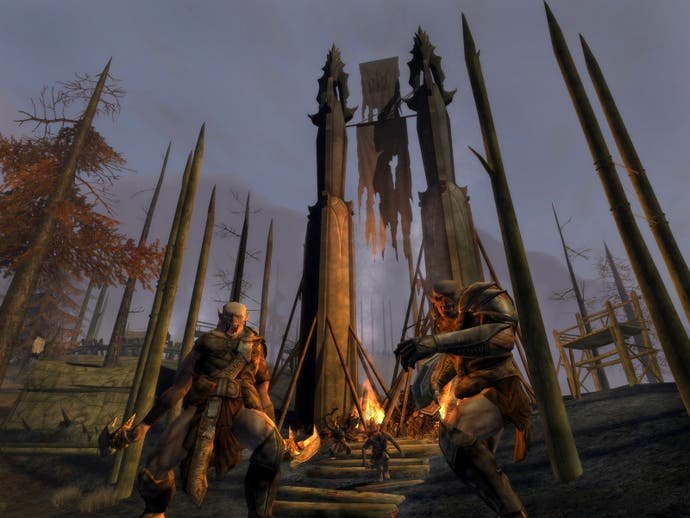
However, that in itself is just window dressing. What's really interesting is that those titles come with Traits associated with them - which could be anything from a skill or stat boost, to a genuinely new skill which your character didn't have previously. Up to 15 of these traits can be equipped at once, out of around 400 which are available. Far from being minor tweaks to your character class, they can make a very serious difference to how you play the game.
For example, a non-magic character could give themselves certain magical abilities - ranged shots perhaps, or healing - by equipping the right traits. That's the real power of this system. It essentially allows a limited type of multi-classing, by giving you the ability to play one primary class but bolt on abilities from other classes to create a more interesting, unique character.


